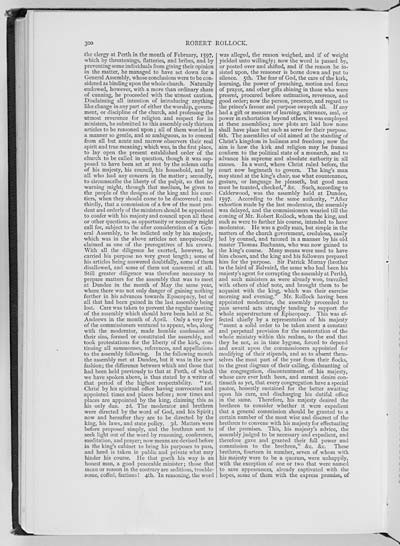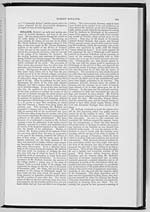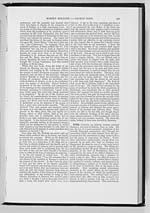300
the clergy at Perth in the month of February, 1597,
which by threatenings, flatteries, and bribes, and by
preventing some individuals from giving their opinion
in the matter, he managed to have set down for a
General Assembly, whose conclusions were to be con-
sidered as binding upon the whole church. Naturally
endowed, however, with a more than ordinary share
of cunning, he proceeded with the utmost caution.
Disclaiming all intention of introducing anything
like change in any part of either the worship, govern-
ment, or discipline of the church, and professing the
utmost reverence for religion and respect for its
ministers, he submitted to this assembly only thirteen
articles to be reasoned upon; all of them worded in
a manner so gentle, and so ambiguous, as to conceal
from all but acute and narrow observers their real
spirit and true meaning; which was, in the first place,
to lay open the present established order of the
church to be called in question, though it was sup-
posed to have been set at rest by the solemn oaths
of his majesty, his council, his household, and by
all who had any concern in the matter; secondly,
to circumscribe the liberty of the pulpit, so that no
warning might, through that medium, be given to
the people of the designs of the king and his cour-
tiers, when they should come to be discovered; and
thirdly, that a commission of a few of the most pru-
dent and orderly of the ministers should be appointed
to confer with his majesty and council upon all these
or other questions, as opportunity or necessity might
call for, subject to the after consideration of a Gen-
eral Assembly, to be indicted only by his majesty,
which was in the above articles not unequivocally
claimed as one of the prerogatives of his crown.
With all the diligence he exerted, however, he
carried his purpose no very great length; some of
his articles being answered doubtfully, some of them
disallowed, and some of them not answered at all.
Still greater diligence was therefore necessary to
prepare matters for the assembly that was to meet
at Dundee in the month of May the same year,
where there was not only danger of gaining nothing
further in his advances towards Episcopacy, but of
all that had been gained in the last assembly being
lost. Care was taken to prevent the regular meeting
of the assembly which should have been held at St.
Andrews in the month of April. Only a very few
of the commissioners ventured to appear, who, along
with the moderator, made humble confession of
their sins, formed or constituted the assembly, and
took protestations for the liberty of the kirk, con-
tinuing all summonses, references, and appellations
to the assembly following. In the following month
the assembly met at Dundee, but it was in the new
fashion; the difference between which and those that
had been held previously to that at Perth, of which
we have spoken above, is thus stated by a writer of
that period of the highest respectability. " Ist.
Christ by his spiritual office having convocated and
appointed times and places before; now times and
places are appointed by the king, claiming this as
his only due. 2d. The moderator and brethren
were directed by the word of God, and his Spirit;
now and hereafter they are to be directed by the
king, his laws, and state policy. 3d. Matters were
before proposed simply, and the brethren sent to
seek light out of the word by reasoning, conference,
meditation, and prayer; now means are devised before
in the king's cabinet to bring his purposes to pass,
and heed is taken in public and private what may
hinder his course. He that goeth his way is an
honest man, a good peaceable minister; those that
mean or reason in the contrary are seditious, trouble-
some, coffed, factious! 4th. In reasoning, the word
was alleged, the reason weighed, and if of weight
yielded unto willingly; now the word is passed by,
or posted over and shifted, and if the reason be in-
sisted upon, the reasoner is borne down and put to
silence. 5th. The fear of God, the care of the kirk,
learning, the power of preaching, motion and force
of prayer, and other gifts shining in those who were
present, procured before estimation, reverence, and
good order; now the person, presence, and regard to
the prince's favour and purpose swayeth all. If any
had a gift or measure of learning, utterance, zeal, or
power in exhortation beyond others, it was employed
at these assemblies; now plots are laid how none
shall have place but such as serve for their purpose.
6th. The assemblies of old aimed at the standing of
Christ's kingdom in holiness and freedom; now the
aim is how the kirk and religion may be framed
conform to the political state of a monarch, and to
advance his supreme and absolute authority in all
causes. In a word, where Christ ruled before, the
court now beginneth to govern. The king's man
may stand at the king's chair, use what countenance,
gesture, or language he pleaseth, but good men
must be taunted, checked," &c. Such, according to
Calderwood, was the assembly held at Dundee,
1597. According to the same authority, "After
exhortion made by the last moderator, the assembly
was delayed, and the commissioners wearied till the
coming of Mr. Robert Rollock, whom the king, and
such as were to further his course, intended to have
moderator. He was a godly man, but simple in the
matters of the church government, credulous, easily
led by counsel, and tutored in a manner by his old
master Thomas Buchanan, who was now gained to
the king's course. Many means were used to have
him chosen, and the king and his followers prepared
him for the purpose. Sir Patrick Murray (brother
to the laird of Balvaird, the same who had been his
majesty's agent for corrupting the assembly at Perth),
and such ministers as were already won, travailed
with others of chief note, and brought them to be
acquaint with the king, which was their exercise
morning and evening." Mr. Rollock having been
appointed moderator, the assembly proceeded to
pass several acts strongly tending to support the
whole superstructure of Episcopacy. This was ef-
fected chiefly by a representation of his majesty
"anent a solid order to be taken anent a constant
and perpetual provision for the sustentation of the
whole ministry within this realme, to the end that
they be not, as in time bygone, forced to depend
and await upon the commissioners appointed for
modifying of their stipends, and so to absent them-
selves the most part of the year from their flocks,
to the great disgrace of their calling, dishaunting of
the congregation, discontentment of his majesty,
whose care ever hath been, and earnest desire con-
tinueth as yet, that every congregation have a special
pastor, honestly sustained for the better awaiting
upon his cure, and discharging his dutiful office
in the same. Therefore, his majesty desired the
brethren to consider whether it were expedient
that a general commission should be granted to a
certain number of the most wise and discreet of the
brethren to convene with his majesty for effectuating
of the premises. This, his majesty's advice, the
assembly judged to be necessary and expedient, and
therefore gave and granted their full power and
commission to the brethren," &c. &c. These
brethren, fourteen in number, seven of whom with
his majesty were to be a quorum, were unhappily,
with the exception of one or two that were named
to save appearances, already captivated with the
hopes, some of them with the express promise, of

![]() Universal Viewer |
Universal Viewer | ![]() Mirador |
Large image | Transcription
Mirador |
Large image | Transcription
![]()

